As a responsible dog owner, you may be wondering if it’s safe to share your favorite spaghetti squash dish with your furry friend. Well, I’m here to provide you with the answer. Yes, dogs can have spaghetti squash! This versatile and nutritious vegetable is not only safe for dogs to eat, but it can also offer several health benefits.
Key Takeaways:
- Squash, including spaghetti squash, is safe for dogs to eat.
- Squash provides several health benefits for dogs, including antioxidants, vitamins, minerals, improved cardiovascular function, boosted immunity, and improved vision in aging dogs.
- It is important to cook squash before serving it to dogs and introduce new foods gradually.
- Monitor for any adverse reactions and feed squash in moderation as part of a balanced diet.
- Other squash varieties, such as butternut squash and yellow squash, are also safe for dogs.
The Benefits of Spaghetti Squash for Dogs
Spaghetti squash can offer several benefits for dogs. It is rich in antioxidants like beta carotene, which can help prevent kidney and heart disease in dogs. Spaghetti squash also contains vitamins A and C, as well as minerals like magnesium, calcium, potassium, manganese, and copper, which are essential for a dog’s overall health.
Additionally, the fiber content in spaghetti squash can support a healthy digestive tract in dogs. Fiber helps regulate bowel movements and promotes regularity. It can also aid in weight management by promoting a feeling of fullness and reducing overeating.
Overall, incorporating spaghetti squash into a dog’s diet can provide them with a variety of nutrients that contribute to their overall well-being. However, it is important to remember that squash should be served in moderation and as part of a balanced diet that meets all of their nutritional needs.
| Nutrient | Amount per 100g of Spaghetti Squash |
|---|---|
| Vitamin A | 56 IU |
| Vitamin C | 2.6 mg |
| Magnesium | 12 mg |
| Calcium | 23 mg |
| Potassium | 140 mg |
| Manganese | 0.1 mg |
| Copper | 0.1 mg |
As with any new food introduction, it is important to monitor your dog for any adverse reactions. If your dog shows any signs of digestive upset or allergies, it is best to consult with a veterinarian. Remember to always serve spaghetti squash in a cooked form and remove any seeds or skin before offering it to your furry friend.
How to Safely Feed Dogs Spaghetti Squash
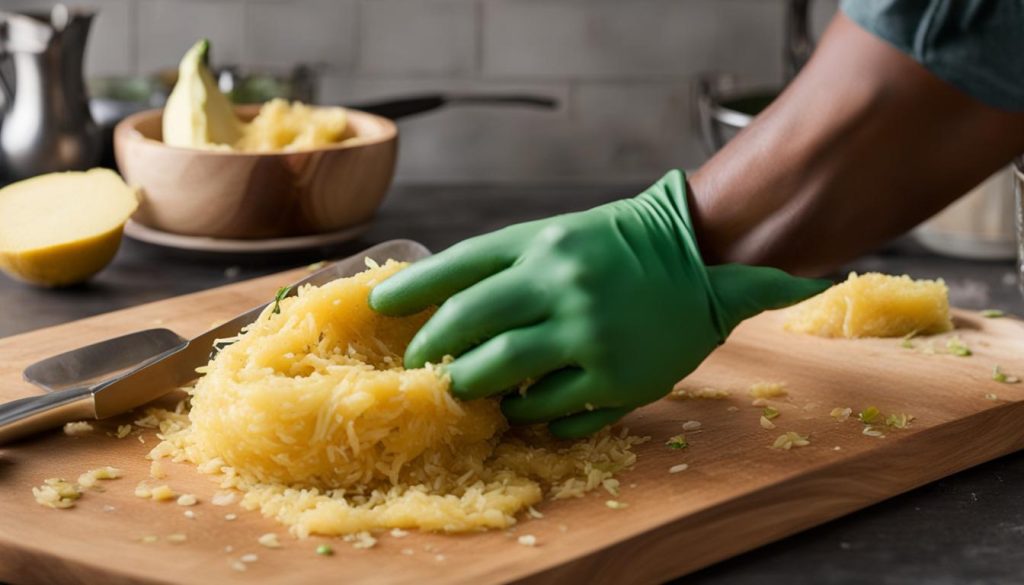
When it comes to feeding dogs spaghetti squash, it is important to take certain precautions to ensure their safety and well-being. Dogs should never be given raw squash, as it can be difficult for them to digest and may not provide the same nutritional benefits as cooked squash. To prepare spaghetti squash for dogs, it can be baked, boiled, or steamed. However, it is crucial to remove the seeds and skin before serving, as these parts can be toxic to dogs.
Cutting the squash into small, bite-sized pieces can make it easier for dogs to eat and help prevent choking hazards. It is also important to avoid seasoning the squash with any sweet garnishing or trimmings, as these can be harmful to dogs. Spaghetti squash can be offered to dogs as a standalone treat or mixed with their regular meals as a healthy alternative to pasta or rice.
When introducing spaghetti squash to a dog’s diet, it is recommended to start with small amounts and gradually increase the serving size. It is important to monitor the dog for any adverse reactions, such as gastrointestinal upset or allergic reactions. If any negative symptoms occur, it is best to discontinue feeding spaghetti squash and consult a veterinarian.
Table: Recommended Cooking Methods for Spaghetti Squash
| Cooking Method | Instructions |
|---|---|
| Baking |
|
| Boiling |
|
| Steaming |
|
By following these guidelines and paying attention to your dog’s individual needs and preferences, you can safely incorporate spaghetti squash into their diet as a nutritious and delicious treat.
Other Squash Varieties for Dogs
In addition to spaghetti squash, dogs can safely consume other varieties of squash, including butternut squash and yellow squash. These squashes offer similar nutritional benefits as spaghetti squash, such as vitamins, minerals, and antioxidants. Just like with spaghetti squash, it is essential to cook these squashes before serving them to dogs and to remove any seeds or skin.
Butternut squash, in particular, is a popular choice for dogs due to its sweet and nutty flavor. It is rich in vitamins A, C, and E, as well as minerals like potassium and magnesium. These nutrients can support your dog’s immune system, promote healthy skin and coat, and aid in digestion.
Yellow squash, on the other hand, is a low-calorie and nutrient-dense option for dogs. It is a good source of vitamins A and C, as well as dietary fiber. The fiber content can promote healthy digestion and bowel movements in dogs.
| Squash Variety | Nutritional Benefits |
|---|---|
| Butternut Squash | – Rich in vitamins A, C, and E – Good source of potassium and magnesium |
| Yellow Squash | – Low in calories – Contains vitamins A and C – High in dietary fiber |
Squash Recipe for Dogs
If you’re looking for a simple and nutritious recipe to incorporate squash into your dog’s diet, here’s a delicious option. This recipe combines chunks of cooked squash with lean, cooked meat to provide a well-rounded meal for your furry friend.
Ingredients:
- 1 cup cooked, unseasoned squash (such as spaghetti squash or butternut squash), diced into small pieces
- 1/2 cup cooked lean meat (such as chicken or turkey), shredded or diced
Instructions:
- Cook the squash until soft and tender. Remove the seeds and skin, and dice it into small pieces.
- Cook the lean meat separately until fully cooked. Remove any bones, skin, or fat, and shred or dice it into small pieces.
- In a bowl, combine the cooked squash and lean meat. Mix well until evenly distributed.
- Allow the mixture to cool before serving it to your dog. Serve in portioned amounts according to your dog’s size and dietary needs.
This simple squash recipe is a great way to introduce the health benefits of squash into your dog’s diet. The combination of squash and lean meat provides a good balance of carbohydrates and protein, along with essential vitamins and minerals. Remember to monitor your dog for any adverse reactions and adjust the portion sizes accordingly to maintain a balanced diet.
| Nutritional Information: | Per Serving (1 cup) |
|---|---|
| Calories | 100 |
| Protein | 10g |
| Carbohydrates | 10g |
| Fat | 2g |
| Fiber | 2g |
| Vitamin A | 1000 IU |
| Vitamin C | 10mg |
| Calcium | 20mg |
| Potassium | 200mg |
Remember, this recipe is intended as a treat or supplement to your dog’s regular meals and should not replace a complete and balanced dog food diet. Consult with your veterinarian to ensure that this recipe aligns with your dog’s specific dietary needs and health conditions.
Moderation is Key

When it comes to feeding spaghetti squash to your canine companion, moderation is key. While squash, including spaghetti squash, can provide numerous health benefits for dogs, it should be incorporated into their diet in appropriate amounts. Feeding your dog too much squash, or any food for that matter, can lead to digestive upset and discomfort.
It is recommended to feed dogs spaghetti squash 3 to 4 times a week as part of a balanced diet. This ensures that your dog receives the nutritional benefits of squash without overwhelming their digestive system. It’s important to consider the overall calorie intake of your dog, as too much squash can lead to weight gain in some cases.
As with any new food introduced to your dog’s diet, it’s essential to monitor their response and look for any signs of adverse reactions. If your dog experiences digestive upset, such as diarrhea or vomiting, it may be an indication that they are not tolerating the squash well. In such cases, it is best to discontinue feeding squash and consult with a veterinarian.
Benefits of Moderation
Feeding your dog squash in moderation ensures that they receive the health benefits of this nutritious vegetable without any negative side effects. Squash, including spaghetti squash, is rich in antioxidants, vitamins, and minerals that support your dog’s overall well-being.
| Benefits of Moderation: | Benefits of Squash for Dogs: |
|---|---|
| Prevents digestive upset | Provides antioxidants |
| Maintains healthy weight | Supplies essential vitamins and minerals |
| Avoids potential allergies or sensitivities | Supports cardiovascular function |
By feeding squash in moderation, you can help ensure that your dog enjoys the benefits of this nutritious vegetable while maintaining a healthy and balanced diet.
Summary
To summarize, while dogs can safely enjoy spaghetti squash and reap its health benefits, moderation is essential. Feeding your dog squash 3 to 4 times a week, as part of a balanced diet, allows them to enjoy the nutritional advantages without causing digestive issues. By monitoring their response and consulting with a veterinarian if needed, you can provide your furry friend with a safe and healthy addition to their diet.
Canine Dietary Needs
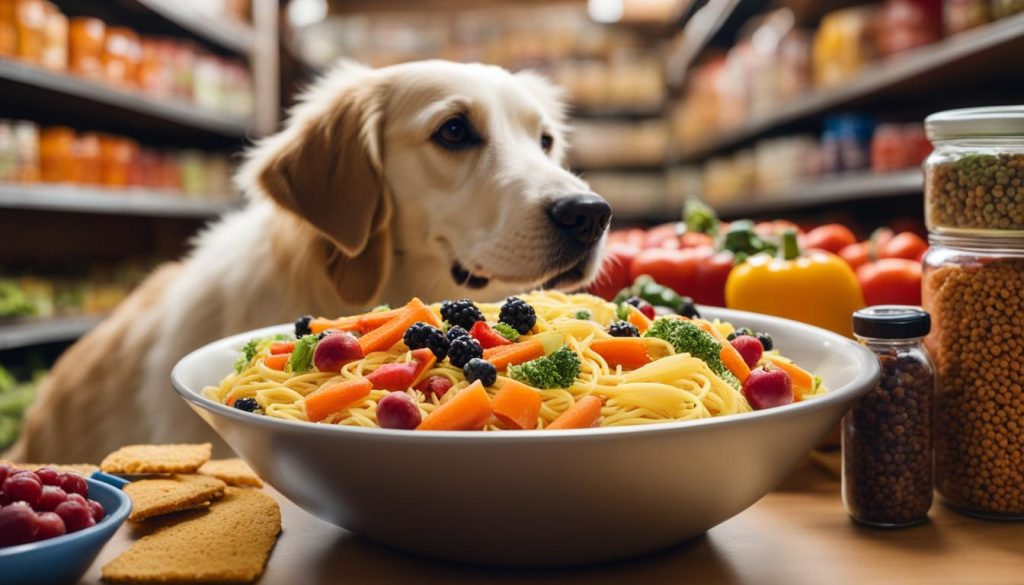
When it comes to maintaining the health and well-being of our furry friends, understanding their dietary needs is essential. Dogs have different nutritional requirements than humans, and it is important to provide them with a balanced diet that meets all of their needs. While squash, including spaghetti squash, can offer some nutritional benefits for dogs, it should not be seen as a substitute for a complete and balanced dog food diet.
Dogs require a combination of protein, carbohydrates, fats, vitamins, and minerals to thrive. A balanced dog food provides all of these essential nutrients in the right proportions. While vegetables, including spaghetti squash, can be a healthy addition to a dog’s diet, they should not be the main focus.
It is important to prioritize high-quality dog food that is specifically formulated for a dog’s age, size, and health needs. This ensures that they receive the appropriate balance of nutrients to support their overall well-being. While spaghetti squash can be incorporated into a dog’s diet as a healthy treat or supplement, it should not be the main component of their meals.
When introducing new foods, such as spaghetti squash, into a dog’s diet, it should be done gradually. Start by offering a small amount and carefully monitor their response. Every dog is different, and some may have sensitivities or allergies to certain foods. If any adverse reactions occur, it is important to discontinue feeding spaghetti squash and consult with a veterinarian.
| Key Points | Summary |
|---|---|
| Dogs require a balanced diet. | Provide dogs with a complete and balanced dog food that meets their nutritional needs. |
| Spaghetti squash can be a healthy addition. | Incorporate spaghetti squash into a dog’s diet as a treat or supplement, but not as the main component of their meals. |
| Introduce new foods gradually. | When introducing new foods, including spaghetti squash, do so gradually and monitor for any adverse reactions. |
Considerations for Introducing New Foods
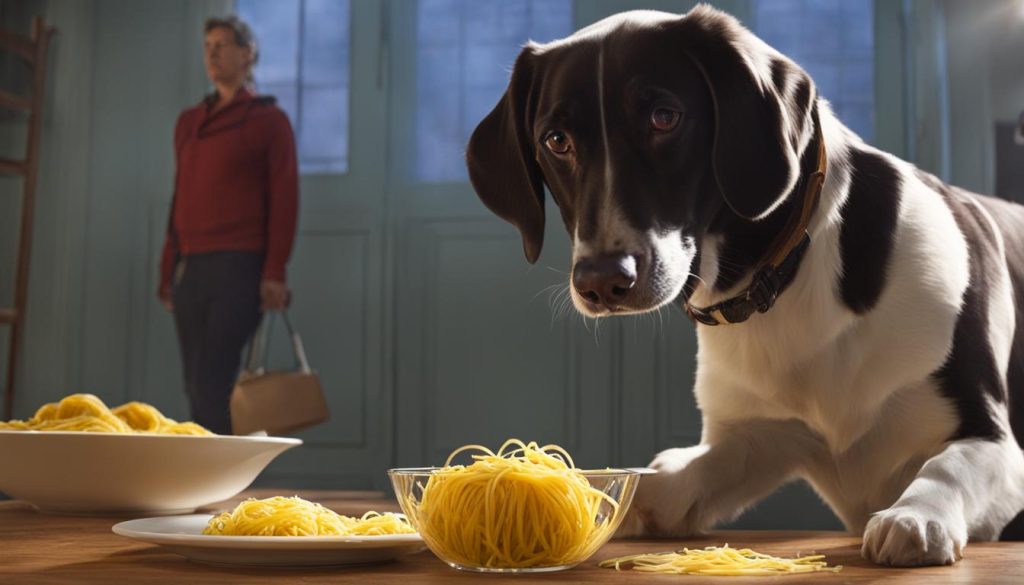
When it comes to introducing new foods into a dog’s diet, such as spaghetti squash, there are several important considerations to keep in mind. Firstly, it is crucial to introduce new foods gradually. Start by offering a small amount of cooked squash and closely monitor your dog’s response. Look for any signs of digestive upset, such as diarrhea or vomiting. If your dog tolerates the squash well, you can gradually increase the amount in their diet.
However, it is important to note that every dog is different, and individual sensitivities or allergies to certain foods can occur. If your dog shows any adverse reactions to the spaghetti squash, it is best to discontinue feeding it and consult with your veterinarian for further guidance.
Additionally, it is worth mentioning that while spaghetti squash is generally safe for dogs to eat, it should always be served in moderation. Too much squash or any food can potentially cause digestive upset in dogs. As a general guideline, it is recommended to feed dogs spaghetti squash 3 to 4 times a week as part of a balanced diet.
Overall, introducing new foods like spaghetti squash into your dog’s diet can be a healthy and enjoyable experience for both you and your furry friend. Just remember to start small, monitor their response, and always prioritize their overall health and well-being.
The Role of Vegetables in a Dog’s Diet
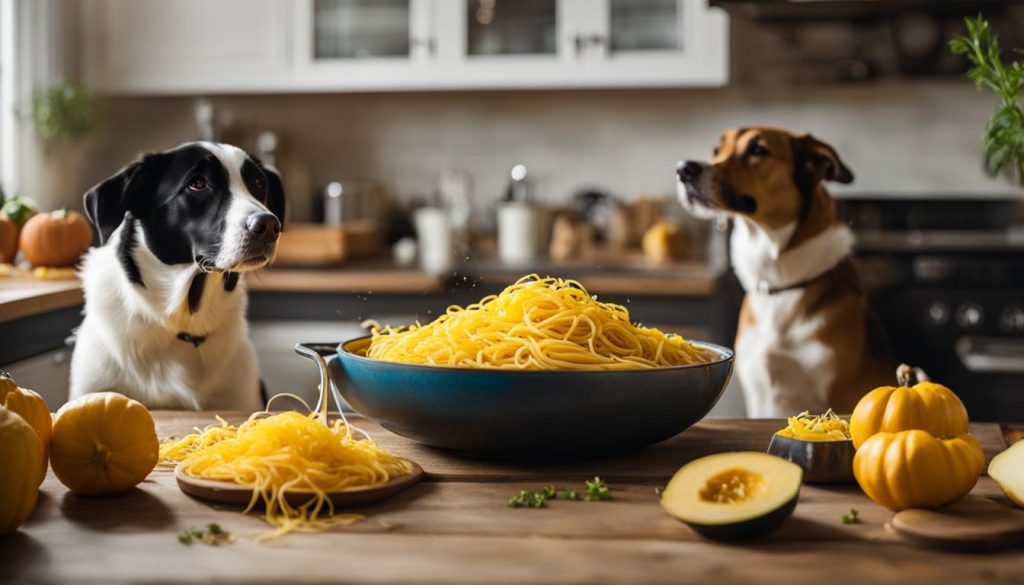
Vegetables play an important role in a dog’s diet as they provide essential nutrients, fiber, and antioxidants that support overall health and well-being. While dogs are primarily carnivorous animals, incorporating vegetables into their diet can offer additional benefits.
Spaghetti squash, in particular, can be a valuable addition to a dog’s meals. It is rich in antioxidants like beta carotene, which can help prevent kidney and heart disease in dogs. The vitamins and minerals present in spaghetti squash, such as vitamins A and C, calcium, potassium, and manganese, are essential for a dog’s overall health. Additionally, the fiber content in spaghetti squash can support a healthy digestive tract in dogs.
Choosing the Right Vegetables for Dogs
While spaghetti squash is safe for dogs to consume, it is important to consider other vegetables as well. Some other dog-friendly vegetables include butternut squash, yellow squash, and pumpkin. These vegetables offer similar nutritional benefits and can be prepared in a similar manner to spaghetti squash. It is important to note that not all vegetables are suitable for dogs, as some may be toxic or difficult to digest. Therefore, it is crucial to research and consult with a veterinarian before introducing any new vegetable into a dog’s diet.
To incorporate vegetables into a dog’s diet, it is recommended to cook them before serving. Cooking vegetables helps break down the cell walls, making them easier for dogs to digest. It is also important to remove any seeds or skin that may be toxic to dogs. Cutting vegetables into small, bite-sized pieces can make it easier for dogs to eat and digest. Vegetables can be served as standalone treats, mixed with regular meals, or even used as a replacement for pasta or rice in certain recipes.
While vegetables, including spaghetti squash, can provide important nutrients for dogs, it is essential to remember that they should not replace the main components of a dog’s diet. Dogs require a balanced diet that includes protein, carbohydrates, fats, vitamins, and minerals. A complete and balanced dog food that is specifically formulated for their nutritional needs should always be the foundation of their meals. Vegetables can be added as occasional treats or supplements to provide variety and additional nutrients. It is best to consult with a veterinarian to determine the appropriate amount of vegetables to include in a dog’s diet based on their individual needs.
| Vegetable | Nutritional Benefits |
|---|---|
| Spaghetti squash | – Antioxidants like beta carotene for kidney and heart health |
| Butternut squash | – High levels of vitamin A and C for immune support |
| Yellow squash | – Rich in minerals like potassium and manganese for overall health |
| Pumpkin | – High fiber content for digestive health |
Shopping for Squash and Dog-Friendly Ingredients
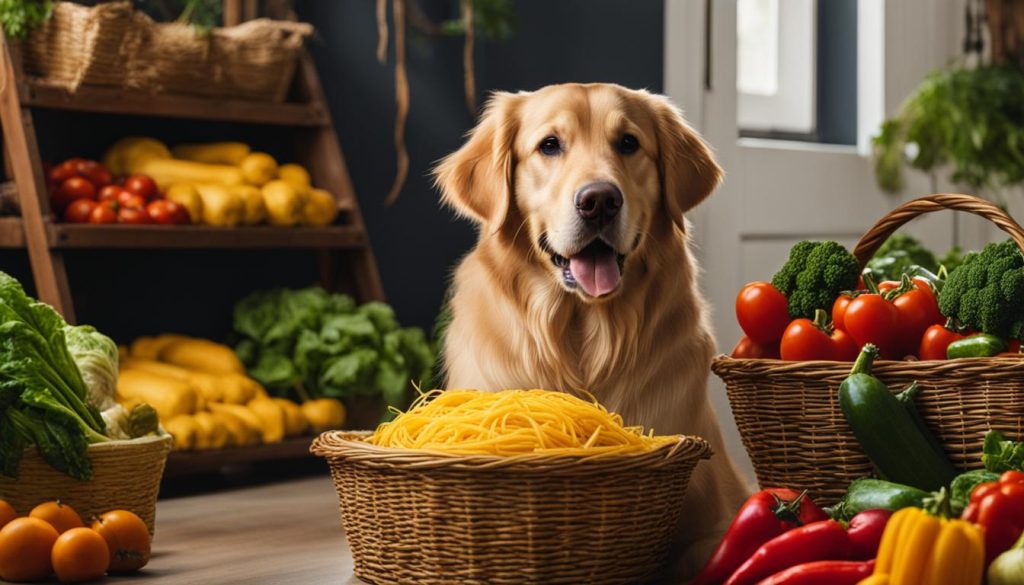
When it comes to shopping for squash to feed to your beloved canine companion, there are a few important considerations to keep in mind. First and foremost, it is crucial to choose fresh and ripe squashes that are free from any signs of mold or rot. Opting for organic varieties can also be a good choice to reduce the risk of pesticide exposure for your furry friend. Remember, the quality of the ingredients you choose directly impacts your dog’s health and well-being.
In addition to selecting the right squash, it is equally important to avoid seasoning or adding any ingredients that may be harmful to dogs. This means steering clear of salt, pepper, and sweet garnishes. When selecting other ingredients to mix with squash, such as meat, opt for high-quality, dog-friendly options that are free from any additives or seasonings that may pose a risk to your pet’s health. Ensuring that your dog’s diet is free from harmful substances is a key aspect of responsible pet ownership.
| Squash | Benefits | Preparation |
|---|---|---|
| Spaghetti Squash | Rich in antioxidants and vitamins | Cook before serving, remove seeds and skin |
| Butternut Squash | Good source of vitamins and minerals | Cook before serving, remove seeds and skin |
| Yellow Squash | Provides essential nutrients and fiber | Cook before serving, remove seeds and skin |
By adhering to these guidelines, you can ensure that the squash you feed to your furry friend is safe, nutritious, and beneficial for their overall health. Remember, the well-being of your dog is in your hands, so make informed choices when selecting ingredients for their meals and treats.
References:
- “Is Squash Safe for Dogs?” by [Author], [Publication Name]
- “The Benefits of Different Squash Varieties for Dogs” by [Author], [Publication Name]
- “Choosing the Right Ingredients for Your Dog’s Diet” by [Author], [Publication Name]
Wrapping Up
To summarize, dogs can safely eat squash, including spaghetti squash. Squash offers several health benefits for dogs, including antioxidants, vitamins, minerals, and improved cardiovascular function. When feeding squash to dogs, it is important to cook it before serving, remove any seeds or skin, and introduce it gradually into their diet.
Squash should be fed in moderation, as part of a balanced diet that includes a complete and balanced dog food. While vegetables, such as squash, can be a healthy addition to a dog’s diet, they should not replace the main components of their meals. Always monitor dogs for any adverse reactions and consult a veterinarian if necessary.
By incorporating squash into your dog’s diet, you can provide them with a nutritious and flavorful treat. However, it’s important to remember that every dog is different, and individual sensitivities or allergies to certain foods can occur. Therefore, it’s crucial to introduce new foods gradually and pay attention to your dog’s response.
So, the next time you’re enjoying some delicious spaghetti squash, feel free to share a small portion with your furry friend. They’re sure to enjoy the taste and reap the benefits of this nutritious vegetable!
FAQ
Can dogs have spaghetti squash?
Yes, dogs can safely eat spaghetti squash.
What are the benefits of spaghetti squash for dogs?
Spaghetti squash is rich in antioxidants, vitamins, and minerals that can support a dog’s overall health and well-being.
How should I safely feed dogs spaghetti squash?
Spaghetti squash should be cooked before serving to dogs. Remove the seeds and skin, and introduce it gradually into their diet.
Are there other squash varieties that dogs can eat?
Yes, dogs can also safely consume butternut squash and yellow squash, among others.
Do you have a squash recipe for dogs?
Yes, a simple recipe is to cut chunks of squash, remove the seeds and skin, and serve it with cooked meat.
How much squash should I feed my dog?
Squash should be fed in moderation, 3 to 4 times a week, as part of a balanced diet.
What are a dog’s dietary needs?
Dogs require a balanced diet that includes protein, carbohydrates, fats, vitamins, and minerals to meet their nutritional needs.
How should I introduce new foods to my dog?
New foods, such as spaghetti squash, should be introduced gradually and monitored for any adverse reactions.
What role do vegetables play in a dog’s diet?
Vegetables, including squash, can be a healthy addition to a dog’s diet, but should not replace the main components of their meals.
What should I consider when shopping for squash for my dog?
Choose fresh, ripe squashes that are free from mold or rot. Organic varieties can be a good option, and avoid adding any harmful ingredients or seasonings.
Can my dog eat squash as their main food?
No, squash should be incorporated as a treat or supplement to a balanced dog food diet, not as the main component of their meals.






